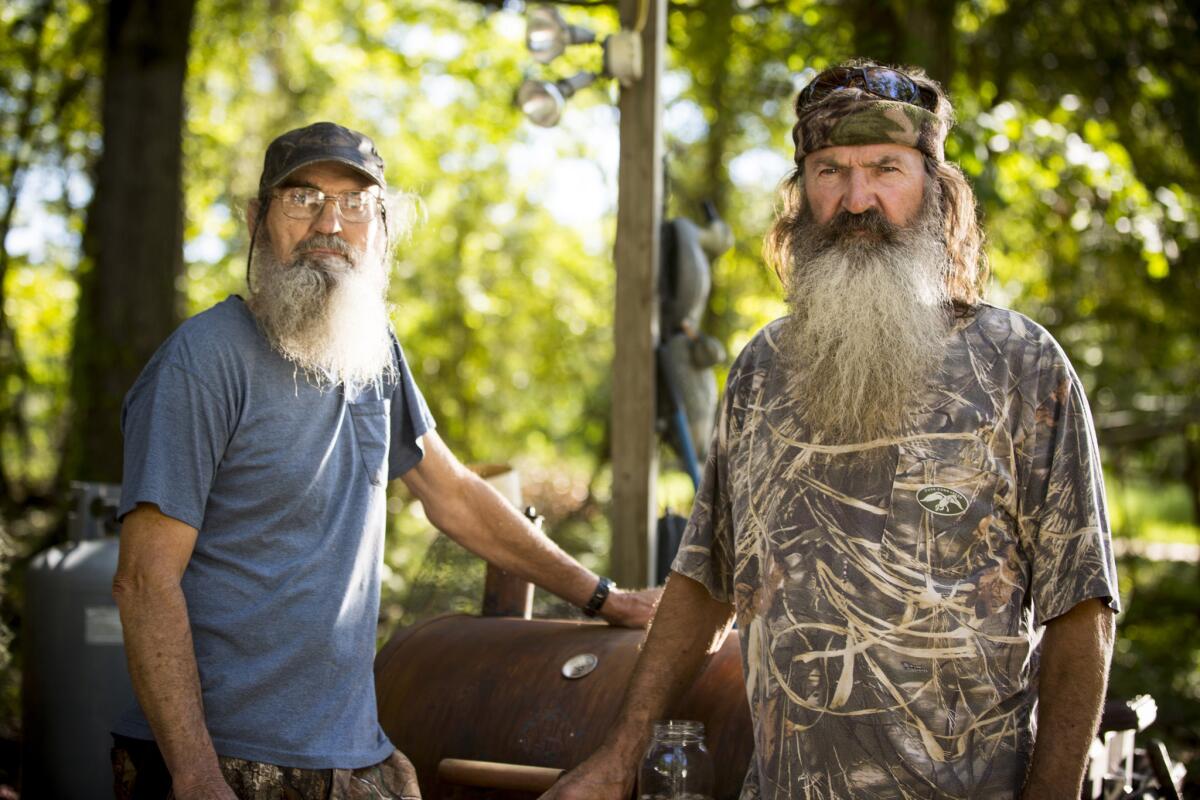‘Duck Dynasty’ and a free society

- Share via
Normally at this time of year, the culture war fight is over a guy with a white beard. That’s true again this year. What’s different is that Phil Robertson has taken Santa’s place, and instead of a war on Christmas, we have a war on “Duck Dynasty.”
The patriarch of the popular A&E; reality show said some crude things about homosexuals to GQ magazine. A&E; was sufficiently offended that it suspended him from a show about his own family.
So far, the controversy understandably has been framed as a fight over free speech. My National Review colleague Mark Steyn writes: “Most Christian opponents of gay marriage oppose gay marriage; they don’t oppose the right of gays to advocate it. Yet thug groups like GLAAD increasingly oppose the right of Christians even to argue their corner. It’s quicker and more effective to silence them.”
YEAR IN REVIEW: Politicians’ lamest apologies in 2013
I think Steyn has the causation right. The free-speech issues are the inevitable consequence of a venerable argument about what a free society is.
Maybe I see it that way because I have Yuval Levin’s wonderful book “The Great Debate: Edmund Burke, Thomas Paine and the Birth of Right and Left” fresh in my mind. Levin chronicles the argument between the Irish-born British parliamentarian and the English-born American polemicist over the role of government and the merits of the French Revolution.
As Levin shows, Burke, the father of modern conservatism, and Paine, an early champion of progressivism, were liberals in the sense that both defended a free society. But their assumptions about human nature and society led them to very different places.
YEAR IN REVIEW: 12 political photos that made us look twice in 2013
Paine saw the individual as the irreducible unit of society. Paine held that with the right application of scientific principles, an egalitarian utopia could be achieved. It would simply require tearing down the prejudices, customs and habits of the old order, just as the French revolutionaries were doing. Paine eventually saw few distinctions between legal and cultural impediments to liberty, which is why he came to denounce Christianity as “repugnant to reason.”
For Burke, no man is an island. We are born into families and communities, and it is these and other institutions that give our lives meaning. Society is a complex and mysterious ecosystem, and no set of experts or “sophisters … and calculators” can impose scientific perfection on it. Any attempt to do so would threaten to destroy all that makes life meaningful. A reformer and proponent of progress, Burke nonetheless believed that progress must be accomplished gradually, not in one fell swoop of a social engineer’s pen.
Perhaps Levin’s most telling insight is that all of Burke’s metaphors about government are about space, while Paine’s are about movement. The Burkean believes government is there to give all of the institutions of society room to thrive and discover what is good through trial and error. The Paineian see progress as a society-wide movement, led by government, with no safe harbors from the Cause. This is why Paine was one of the earliest advocates of a welfare state — funded by a massive inheritance tax — that would intervene to empower every individual.
President Obama’s second inaugural was a thoroughly Paineian document. In his telling, America is made up of individuals and a government with nary anything in between. And because “no single person” can do the things that need to be done, “we must do these things together, as one nation.”
The debate over homosexuality and gay marriage is part of a much larger debate that includes everything from Obamacare — particularly its hostility to religious exemptions — to school vouchers, federalism and the “wars” on women, Christmas, trans fats and inequality.
The children of Burke form the philosophical core of what was called the “leave me alone coalition,” a broad group of institutions and individuals who rightly, and occasionally wrongly, rejected a top-down effort to impose a one-size-fits-all vision of society. The children of Paine, empowered by their sense of cosmic justice, want all of society’s oars to pull as one. And if you don’t pull your oar to the beat of their drum, prepare for their wrath.
jgoldberg@latimescolumnists.com
More to Read
A cure for the common opinion
Get thought-provoking perspectives with our weekly newsletter.
You may occasionally receive promotional content from the Los Angeles Times.







